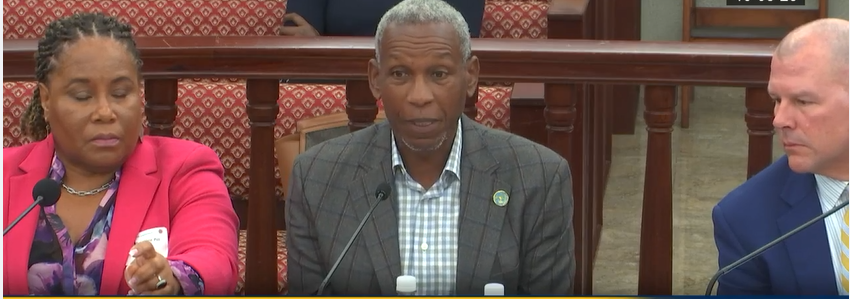
The territory might be getting a bit over-networked, according to Stephan Adams, chief executive officer of the V.I. Next Generation Network.
Anyone listening to representatives from Viya, Liberty Communications of Puerto Rico/USVI, and Adams testifying at the Senate Committee on Housing, Transportation, and Telecommunications Tuesday could not be blamed if they came to the same conclusion.
Everyone wants their own network and problems arise when they want to get on the Water and Power Authority’s poles and obtain Public Works Department permits.
Ricardo Portela, representing Liberty, outlined to the committee the problems he was having getting permits from Public Works to meet goals for a network Liberty is installing. That project, Connect USVI, is supported by an $84 million grant from the FCC. FCC requires that Liberty build broadband service to all locations in the territory with speeds of 1 gigabit per second. Portela had stated the problems to the Public Services Commission last month.
When Liberty was asked why it couldn’t tie into the Next Generation Network, Wanda Pérez, Government Affairs internal counsel for Liberty, responded that the network was not up to Liberty’s standards.
Adams called that a “hollow argument.” He said the real reason was that corporations wanted assets and a network would be an asset.
Portela said 15 percent of the Connect USVI project would be above ground. For this, Liberty needs pole attachment rights from the Water and Power Authority. According to Portela, Liberty has been trying to get a pole attachment agreement with WAPA for more than a year and has experienced “serious headwinds” and “to date no progress on that has been made.”
Andrew Smith, executive director of WAPA, said he was willing to work with Liberty but there were constraints and he had not talked to the Liberty representatives who were testifying to the committee.
When Liberty took over AT&T customers, many customers were asked to give up their 340 area code. Several senators raised concerns about this. The Liberty representatives had no explanations.
Geraldine Pitt, chief executive officer for Viya, testified that with her company, you could “keep your number and switch your network.” She added, “There was a great deal of confusion in the market, and we were the primary provider advising customers of their options and reminding them that they could keep their number if they ported to Viya because 340 is a part of your V.I. identity.”
Chairman Sen. Marvin Blyden said he was disappointed that members from the administration who were invited to testify Tuesday did not show up for the meeting. Jean-Pierre Oriol, commissioner of the Department of Planning and Natural Resources; Derek Gabriel, commissioner of the Public Works Department; and Jenifer O’Neal, director of the Office of Management and Budget, were invited but did not attend the hearing.


